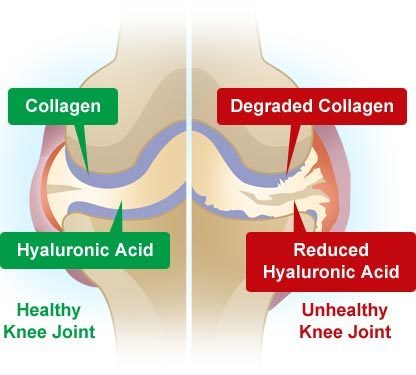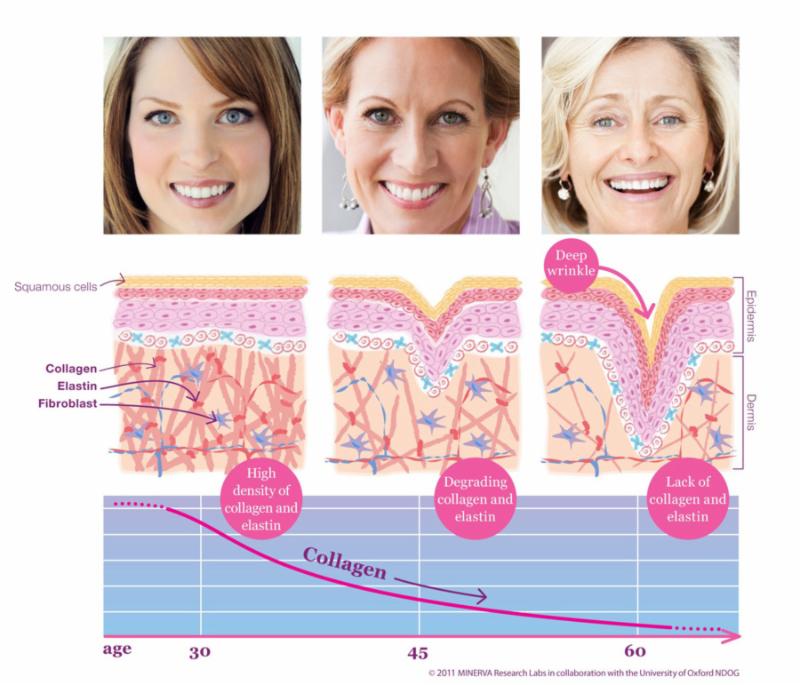Collagen is the building block of so much, healthy skin, healthy joints, a healthy gut, healthy bones. Our bodies produce it naturally but by the time we are in our 20s, collagen production decreases by about 1% each year. By the time we’re in our mid-40s, our collagen levels can fall by 30%.
What we put into our bodies as well as other lifestyle factors can have an effect on our collagen levels. Let’s take a look at the things that deplete our collagen and how we can protect and increase it.
What is Collagen?
Collagen is the most abundant and strongest protein in our bodies, making up about 75% of the weight of your skin and about 30% of your total body protein mass. It’s formed by the cross-linking and weaving together of amino acids to form collagen fibers.
Proteins are made up of amino acids including glycine, proline, arginine, and hydroxyproline. Collagen is a chain of more than 1,500 amino acids. Collagen is the underlying connective tissue and present in nearly everything in our bodies including our heart, lungs, arteries, skin, muscles, bones, cartilage, hair, joints, skin and nails.
The loss of collagen as we age can affect all of these things making us look and feel older than our actual biological age.
Our Bodies Make Collagen
Collagen is a naturally occurring substance in our bodies. To make it, our bodies combine amino acids found in protein rich foods. To do this also requires Vitamin C, zinc, and copper. We can get protein and the other ingredients from the food we eat.
But as we get older, the body may not absorb or synthesize these substances as efficiently as it used to. This is part of the reason for the gradual drop off of collagen production.
Consequences of Collagen Loss
When we lose collagen, the most obvious sign is sagging skin. The plump face of our youth starts to sag. But the loss is affecting us in ways we can’t see. Our bones lose density which puts us at risk of fractures. Our joints and ligaments weaken and lose elasticity leading to pain and reduced mobility.
Our hair may thin and because the walls of our blood vessels are made of collagen, the loss of collagen can cause blood pressure issues. Collagen aids in wound healing and diminished collagen can mean wound healing can take longer which can lead to infection.
So basically, nothing good comes from the loss of collagen!

Why Collagen Decreases
There are some factors that affect collagen loss that are hard to control like radiation exposure, fluoride in water, stress, and trauma. But there are other factors that are in our control and most of them are the things we choose to put into our bodies.
Refined Sweeteners-These have a noticeable effect on skin because they degrade both collagen and elastin, two skin proteins we need for plump, healthy skin. Refined sweeteners should be completely avoided.
Natural sweeteners like dates, honey, and pure maple syrup are better choices but should still be consumed only occasionally.
Artificial Coloring-These are bad for your skin and your body. They cause inflammation which damages collagen.
Alcohol-Alcohol is dehydrating and our skin requires hydration for collagen production. Without enough hydration collagen fibers crack leaving skin dry and flaky.
Coffee-Too much coffee, as little as two to three cups a day can increase production of cortisol, a stress hormone. Cortisol can thin the skin.
Smoking-Smoking does nothing good for our bodies and that goes for our skin too. Smoking really does a number on collagen and the results will be especially noticeable around the mouth and eyes.

Boost Your Collagen
This all sounds pretty grim but don’t despair! There are ways you can boost your collagen levels. There are plenty of things we can do to help preserve the collagen we do have and even increase our body’s collagen production.
Get Your Beauty Sleep-There is a connection between quality sleep and the production of human growth hormone (HGH). HGH stimulates collagen production in muscles and tendons so get those eight hours.
Hit the Gym-Exercise, particularly weight lifting and High Intensity Interval Training (HIIT) stimulates the production of HGH and collagen.
Brew Some Broth-Bone broth is a great source of collagen. The process of simmering bones, joints, and skin for several hours releases their collagen which is broken down into a collagen rich gelatin that the body absorbs easily. Bone broth can be drunk like tea or used as a base for soups and stews.
Get Your C-Vitamin C. Plenty of this vitamin can help protect the skin from the oxidative stress (smoking, too much sun exposure, pollution) that causes collagen breakdown. Foods high in Vitamin C include red bell peppers, broccoli, brussel sprouts, and cauliflower.
Break an Egg-Eggs contain protein and the trace mineral zinc, two important components of collagen production. They also contain lysine and proline which encourage collagen production.
Ginseng-This herb has been found to increase the amount of collagen in the bloodstream. It also has anti-inflammatory and anti-oxidative properties that can help combat the effects of aging on our skin and bodies.
Protect Your Skin-All experts agree that the best thing we can do to protect our skin from premature aging is to regularly wear sunscreen. I’ll add to that a sunhat which is more fun to wear than sunscreen! UV rays have a dreadful effect on collagen.
Reduce Stress-Easier said than done I know but stress, especially chronic stress increases cortisol which is damaging to collagen. Find a stress relieving method that works for you, yoga, meditation, or journaling are just a few options.
Take High-Quality High-Bioavailability Supplements:
I have researched meticulously as well as tried personally, tested with my family members the effects of a variety collagen products. Professionally, I did an uber extensive search to be able to offer my patients and clients the BEST available collagen and collagen-boosting supplements that work absolutely amazingly and quickly!
Reply to this newsletter or text me at 646-436-5311 to get the best available collagen supplements or to learn more about what makes them different!
Keep it Up!
I’m always so disheartened when I hear people just accepting things like aching joints, sagging skin, and reduced mobility as “Just one of those things that happen when you get older.”
While it’s true that none of us can totally mitigate the effects of aging, it is absolutely not true that our fate is entirely out of our hands and we just have to accept our lot in life as we get older.
